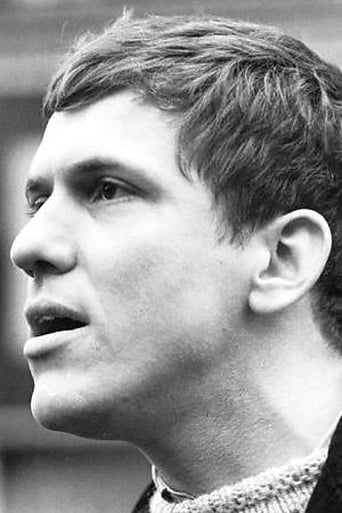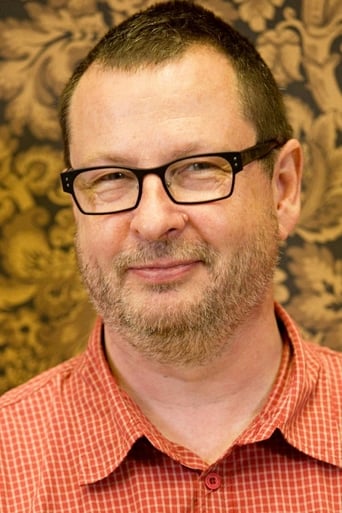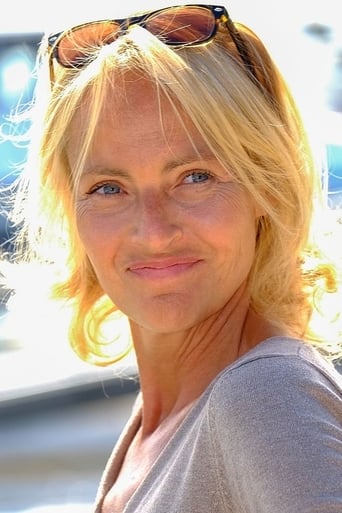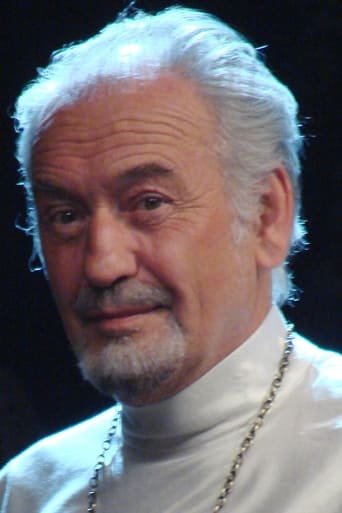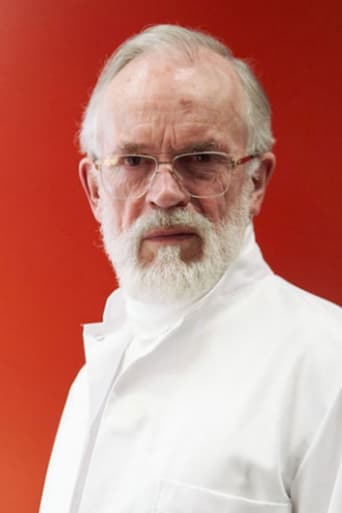Exoticalot
People are voting emotionally.
Rijndri
Load of rubbish!!
StyleSk8r
At first rather annoying in its heavy emphasis on reenactments, this movie ultimately proves fascinating, simply because the complicated, highly dramatic tale it tells still almost defies belief.
Rio Hayward
All of these films share one commonality, that being a kind of emotional center that humanizes a cast of monsters.
Anna ten Bensel
To express simply is to express nothing at all. Lars Von Trier is an absolute genius and Jorgen Leth certainly has what it takes to know how to fight pressure from Trier himself. It's absolutely amazing to watch to renown filmmakers challenge one another. As a young filmmaker and art advocate, to see Von Trier push Leth the way he does in this film is a sight to be seen. Leaving Leth exposed, the audience is able to capture what has never be captured or communicated before on film - Leth's depression. After reading Bjork's statement on Dancer in the Dark and what a mind blowing experience it was, as an audience member, I am now able to see how Trier can push you down and pull you back up. This challenge provided the perfect jumping off point for artists pushing each other to do greater things. Truly a must-see film for those contemporary film fanatics.
MisterWhiplash
The Five Obstructions is a one-of-a-kind film, but one that might be familiar to anyone that is in a school of some kind for an art-form. You know the kind: you'll have a teacher look at something you did, and say 'it was not done as to how I said it should be', and give a grade accordingly or tell you to do it again. Lars von Trier is running the school of sorts in The Five Obstructions, and his student, aptly enough, is one of the people who made him want to become a director: Jorgen Leth, an experimental/avant-garde director whose film, artistically mesmerizing and pretentious The Perfect Human, is put to a test. Or rather, von Trier tests himself, I suppose, by testing his mentor: remake the film five times, based on 'obstructions' that are set up.In other words, it's a bit like the Dogme 95 school in action, only not really in that it's not Dogme 95 rules. It's rules that von Trier makes for Leth, a perfectly pleasant and dedicated artist, in order for him to tap deeper into himself, to find something in his art that isn't really there. The rules are outrageous and intriguing: make the film with only 12-frames-per-cut in Cuba and with no set, and make the film again as... a cartoon (both filmmakers hate cartoons, and it also is meant to give Leth a sense of total control... to be sloppy). Lastly, we see von Trier's own obstruction, a film with Leth's name as director and narration reading a letter to 'Silly von Trier', that is not great as a short by itself but does wrap the film around and sum it up very nicely and completely - whose really following the rules, the defender or the attacker? Who reveals himself more in this sort of "chess-match" that is always jovial and done in the spirit of creating film? No other documentary I can think of shows filmmakers like this in the process of creating. Leth is perfectly willing to go along with von Trier, even as he sees it, if only at first, like a punishment of some sort to do the Cuban film with only 12-frame splices. Von Trier, on the other hand, always is dissatisfied, but it is for him like a therapy session as opposed to just a film challenge. He's testing himself much more, arguably, than he is testing Leth, because he is the one coming up with these rules, that it's about what he sees in the film from Leth, putting cards on the table. After seeing Antichrist, a film that I didn't respond to favorably, I can at least understand the man who made it: Von Trier will provoke himself first, and is intentionally wanting films to be sloppy and crude and even just crap, since that's how he deals with the personality crisis of an artist. Leth, meanwhile, is sharp and calm and cool, and when given 'Complete Freedom' in an obstruction comes up with a totally free-form version. Is the distance still there that von Trier so desperately wants his mentor to break? It's a fascinating game and search into the artistic soul, but it's also massively entertaining to see these two filmmakers- one who is notorious as a provocateur while the other will be seen by many for the first time in a film, or his film Perfect Human for that matter- dig deeper into the nuts and bolts of process, of what is at stake with where you film, who you film, what means in the technology. It's also very funny, just seeing von Trier in his quietly menacing way about this artistic fellow Leth (he mentions, like a comic-book villain, that he is an "expert" on Leth and knows him better than he knows himself), and seeing Leth in his own process is fascinating too, how more professional he is but also, like his pupil and challenger, willing to take risks. And the films themselves that are remade, arguably, are better and more wildly imaginative than the original was (my favorites were the Cuban and animated one, though the Bombay film held its own elusive charm).Not everyone will be thrilled with it- some may begrudge von Trier for putting someone he admires so into such a tight spot that he has to creatively get out of- but those who respond to it should find something that speaks to them. Hell, it may even make filmmakers take on obstructions of their own. Or, at least, people can know what it's like for Lars von Trier to make a film, with only seeing one of them directly. Amazing.
MartinHafer
While many art house patrons might enjoy this film immensely, the average person would have little interest in the movie. Instead of a conventional plot, the film was created by a documentary director (Lars von Trier) and he interviews veteran director Jørgen Leth about his early art film 'Det perfekte menneske' and challenged him to remake this esoteric film after given certain strict and rather arbitrary parameters ("obstructions"). Some of these requirements help to make up some dandy short films and some are just bizarre. One of the more bizarre ones actually works very well, as Leth had to make an edit every 12 frames (i.e., every 1/2 second) and the final result was unusual but watchable. I also liked the cartoon version Leth created--even though he swore that he hated cartoons. Some were pretty silly.However, while the ideas were intriguing, the original film was just too "artsy-fartsy" for me. Von Trier, by the way, was one of the creators of the "Dogme 95 movement"--an avant-garde manifesto that sought to create simple and "pure" films, free of the usual Hollywood clichés. In some cases (like FESTEN), this was a good thing but in other cases the films are quite difficult to watch and dull. Sure, I love foreign and independent films, but this one looked like it strictly for the beret-wearing, espresso- swilling bohemian crowd. It just wasn't my cup of tea, though the film was at times interesting. But is it really worth wading through the tedium to find a few glimpses of brilliance?
Claire Oscuro
Jorgen Leth and Lars von Trier's Five Obstructions is, in a certain sense, collaboration as confrontation. The restrictions von Trier places on Leth are designed to frustrate the latter's inclination to distance, stylization, and abstraction (tendencies antithetical to the naturalism, spontaneity, and transparency of the Dogme school), and at least one restriction ("complete freedom") is explicitly intended as punishment for Leth's too-loose interpretation of a previous directive. Belying this atmosphere of conspiratorial coercion is the documentary footage of the meetings between the two directors, where their interaction is friendly and warm, not to say giddy. But other footage of Leth when von Trier is absent shows the elder director as bleak, almost stunned. In this game of flip-flopping submission and dominance, von Trier insists that Leth lower his guard (or his standards) and produce the kind of work von Trier repeatedly describes as "crap." Von Trier's not interested in art, but in therapy, as he reveals in the banal Obstruction #5, in which black-and-white documentary footage of the making of the previous four Obstructions are set as an illustrative montage to the sound of Leth's voice reading a letter to him written by von Trier, which exposes with crude and merciless sentimentality Leth's struggle with depression and von Trier's crusade to save him through the making of this film. Von Trier's mission would appear to be self-defeating, inasmuch as the brilliant flashes of ecstatic engagement that Leth displays throughout the documentary footage all occur when he has, despite von Trier's traps, continued to produce the gorgeous and intelligent cinema for which he is renowned (most notably in the very first and very best Obstruction, filmed in Cuba, which must answer the questions posed by the narrator of the original Perfect Human film, and which must contain no edit longer than twelve frames). Perhaps Leth's grimmest moment comes after he's screened his fourth Obstruction, a cartoon, for von Trier, who praises it slyly as representing the best of the best in the MTV style. Leth is clearly devastated, and we sense that he may have reconsidered his original comparison of himself with Faust and von Trier with Mephistopheles – Faust, after all, did make a more or less fair exchange of his immortal soul for knowledge, while Leth has traded his own soul in order to be made a fool. While von Trier is right in saying at the outset, however, that none of the Obstructions will rival the original Perfect Human for either perfection or humanity, the collaboration yields some incredible results, not least of which is the documentation of the creative process itself. In the end, both von Trier's cruelty and his sentimentality seem suspect, and the documentary footage suddenly leaps into focus when we remember the way in which Dogme films often seem to wear the costume of the documentary or home movie. It's no fair asking to what extent the antagonism in von Trier and Leth's collaboration is actually a collusion between the directors. Regardless of how much of this film plays by Dogme's rules, however, nearly all the remakes shed a stunning illumination on the original Perfect Human and are themselves a delight.

